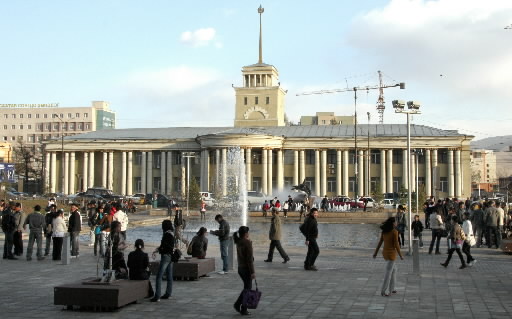Nuclear weapons can be eliminated: Chapter 3, Part 1
Jun. 19, 2009
Chapter 3: Mongolia’s challenge
Part 1: Security through diplomacy
by Keisuke Yoshihara, Staff Writer
Single state nuclear-weapon-free status is declared
During the Cold War, pitting East and West, Mongolia was ruled by the former Soviet Union and its intermediate-range ballistic missiles, capable of carrying nuclear warheads, were deployed on Mongolian territory. However, since 1990, when the country became a democratic nation, the country has been engaged in a unique undertaking to have the international community recognize its status as a “nuclear-weapon-free zone” comprising only a single state. The Chugoku Shimbun probed this “nation of nomads,” whose resolute actions have swayed the positions of larger powers.
Mongolia’s capital city of Ulaanbaatar is stretched out on a highland at an elevation of 1310 meters above sea level. On Peace Avenue, which crosses the heart of the city, trees alongside the road have issued spring buds and the horns of Japanese cars are a constant feature of the background noise. The building of the Ministry of Foreign Affairs and Trade stands here, a building constructed by former Japanese soldiers who were detained by the Soviet Union some 60 years ago.
I was ushered into a room where I interviewed Tsedendamba Batbayar, 51, a policy advisor, about the developments involving Mongolia’s steadfast policy of denuclearization. Mr. Batbayar is an expert on the history of foreign diplomacy and his book Modern Mongolian History was published not only in Mongolia, but also in Japan.
“Mongolia is a small nation sandwiched between Russia and China,” Mr. Batbayar said. “Upon its democratization, the nation decided to preserve its national security through diplomacy and politics, not through military force.” During our interview, Mr. Batbayar sprinkled in Japanese expressions, which he said he had learned while in the Soviet Union.
In September 1992, at United Nations headquarters in New York, President Punsalmaagiin Ochirbat, addressed the member states, announcing, “To strengthen disarmament and trust building in the region and in the world, Mongolia declares its territory a nuclear-weapon-free zone. Mongolia will be engaged in policy measures to have its status internationally recognized.”
Then, in December 1998, the nation’s resolution recognizing “Mongolia’s single state nuclear-weapon-free status” was adopted at the United Nations General Assembly. Along with the declaration delivered at U.N. headquarters, Mongolia was able to succeed in this effort by sending presidential envoys to the nuclear weapons states to appeal its case.
Former President Ochirbat, now hospitalized, recalled in a written response to the Chugoku Shimbun’s inquiry: “The five major nuclear powers took a cautious stance, but we persevered in our efforts to explain our policy and principles, and we won their understanding.”
Challenges also existed at home. The people of Mongolia did not clearly understand the significance of the declaration and resolution at the United Nations. The U.N. ambassador at the time and other figures began to compile materials for parliamentary members and hold study sessions to promote greater recognition of this effort. These advocates were able to persuade the parliamentary members that a single state nuclear-weapon-free status would be the most peaceful option for preserving the nation’s national interest and security. Thus, in 2000, Mongolia enacted its own domestic legislation, the Nuclear-Weapon-Free Status Law.
The next challenge is to conclude a trilateral treaty with Russia and China. In March 2009, Mongolia held discussions with the two nations in Geneva, Switzerland. It seeks to produce a legally binding document whereby penalties are stipulated in such cases as transiting nuclear weapons within its territory.
“Our denuclearization policy is only 80% complete. I believe that concluding the treaty will bring us to our goal,” said Mr. Batbayar with conviction.
(Originally published on June 1, 2009)
To comment on this article, please click the link below. Comments will be moderated and posted in a timely fashion. Comments may also appear in the Chugoku Shimbun newspaper.








